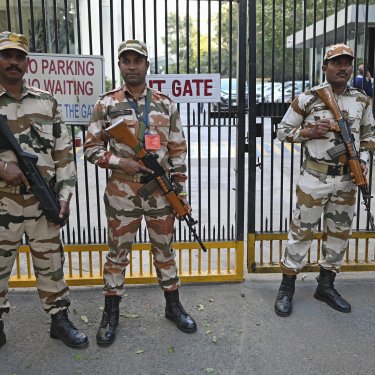BBC offices raided in India in latest Modi assault on press freedom

Indian tax department raids on BBC offices in Mumbai and New Delhi have all the hallmarks of a reprisal for the release of a documentary critical of Prime Minister Narendra Modi three weeks ago, says Reporters Without Borders (RSF), denouncing the government’s attempts to clamp down on independent media.
The BBC’s offices in Mumbai and New Delhi were searched for the second day running on 15 February in an investigation into supposed tax evasion by the British public broadcaster. Journalists’ working documents and phones were seized in the course of the searches.
Officials said the BBC was suspected of violating “transfer pricing rules” and “diversion of profits.” But, when asked about the raids, the response from the spokesman of the ruling Bharatiya Janata Party (BJP) was indicative of the real reason. “India is a country which gives an opportunity to every organisation... as long as you don't spew venom,” he said.
“These raids have all the appearance of a reprisal against the BBC for releasing a documentary critical of Prime Minister Narendra Modi three weeks ago. They have come at a time when independent media are being hounded more and more, and when pluralism is shrinking in India due to increased media concentration. It is essential that international media like the BBC can continue to operate in India without being harassed, and that the rights of journalists and, in particular, the confidentiality of their sources, are respected in this investigation.
In January, the BBC was accused of “anti-Indian propaganda” when it released the documentary entitled “India: The Modi Question”, which sheds light on Modi’s role in violence between Hindus and Muslims in the western state of Gujarat in 2002, when he was the state’s chief minister. The government blocked all posts on Twitter and YouTube with links to clips from the documentary, and students at a Delhi university were even arrested on 25 January for trying to hold a screening.
Misuse of tax inspectors
The BBC, which says it is cooperating with the tax department’s investigation while continuing its journalistic work as normal, is not the first media outlet to be subjected to this kind of administrative and judicial harassment by the Indian authorities.
After daring to criticise the government, several journalists, media outlets and human rights groups have been inspected by agencies tasked with combatting financial crimes. In July 2021, for example, tax inspectors raided around 30 Dainik Bhaskar bureaux after this newspaper, one of the most popular in India, questioned the government’s handling of the Covid-19 pandemic. Tax officials raided the Newslaundry and NewsClick websites a few months later, after keeping them in their sights since June 2021.
